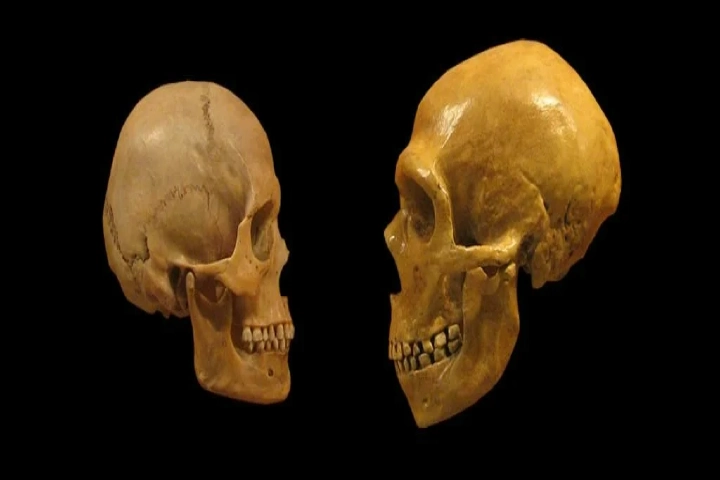

Slow and gradual development of human brain gave the Homo sapiens an edge over others, including their closest relative, Neanderthals (Pic. Courtesy sciencealert.com)
<p>
<strong>Among the several varieties that constitute the broad category of archaic humans, it was the Homo sapiens who emerged as the winner. Studying the reason for this, researchers as per a report in sciencealert.com working on mice have discovered that vital parts of the brain of modern man took longer to evolve as compared to Neanderthals, their extinct cousin.</strong></p>
<p>
The time difference in this development could be compared to the deduction drawn from the tortoise and hare story: slow and steady wins the race.</p>
<p>
Differences in protein is the reason for this extra time and yet it is very important and useful as it decreases errors in chromosomes, leading to a population which is healthy and in better shape.</p>
<p>
The research points out that the development of human being&rsquo;s neocortex, which is wrinkled in appearance and is the outer layer taking care of higher order thinking, has a major part in safeguarding us from diseases. This attribute is missing in Neanderthals.</p>
<p>
With the advancement in technology and science connected with genetics, scientists are now able to take out DNA from ancient remains and sequence it. Adopting this method, they found detailed information which helped them to juxtapose the Neanderthal genome with that of modern human beings.</p>
<p>
It came to light that 100 amino acids, which helped in creating proteins changed when the human beings separated from the branch which led to Neanderthals and Denisovans, another close relative of modern human beings.</p>
<p>
The substitution of amino acid is notable yet researchers are not clear as to which functions changed between Neanderthals and Homo sapiens due to that.</p>
<p>
Among the substitutions, six are found in proteins that play a major part in the distribution of chromosomes when the cell divides. The researchers led by Felipe Mora-Berm&uacute;dez, a geneticist at Germany&rsquo;s Max Planck Institute of Molecular Cell Biology and Genetics, conducted experiments to find out how these changes in amino acids played a role in the development of neocortex.</p>
<p>
Doing the experiments on mice, they replaced the same six amino acids in the rodents with those that are present in human beings.</p>
<p>
Going beyond this, they also farmed organoids of human brains from embryonic stem cells, which are brain tissues that are not alive or sentient, and substituted amino acids of modern humans with variants found in Neanderthal/mouse/ape.</p>
<p>
Findings from this experiment were stunning and spelling binding.</p>
<p>
Explaining them, Mora-Berm&uacute;dez said: <a href="https://www.sciencealert.com/scientists-have-found-evidence-that-human-brains-develop-more-slowly-than-neanderthals-did?utm_source=ScienceAlert+-+Daily+Email+Updates&amp;utm_campaign=84557e1d21-MAILCHIMP_EMAIL_CAMPAIGN&amp;utm_medium=email&amp;utm_term=0_fe5632fb09-84557e1d21-366100389">&quot;We found that three modern human amino acids</a> in two of the proteins cause a longer metaphase, a phase where chromosomes are prepared for cell division, and this results in fewer errors when the chromosomes are distributed to the daughter cells of the neural stem cells, just like in modern humans.&quot;</p>
<p>
In the Neanderthalised human organoids, the metaphase was shorter and it caused twice the number of chromosome separation errors compared to the control organoids. This pointed to the three modern human amino acid substitutions which caused fewer chromosome distribution errors compared to Neanderthals.</p>
<p>
Polysomies or the errors in the number of chromosomes can lead to serious disorders and also cause cancers like leukaemia and carcinoma. Thus, the changes which took place were beneficial to modern humans. Further, the brain function in Neanderthals may have been affected by this higher rate of chromosomal disorders as compared to Homo sapiens.</p>
<p>
In their paper which was published in Science, a peer-reviewed journal, the scientists wrote: &quot;The present data imply that the probability of any such detrimental effects of chromosomal mis-segregation may be lower in modern humans than in Neanderthals, Denisovans, and apes. Further work is needed to address the importance of these effects for traits characteristic of modern humans.&quot;</p>
India and Maldives on Friday announced the initiation of negotiations for the launch of a…
Prime Minister Narendra Modi on Friday said that India has always been a close friend…
In a significant crackdown on objectionable digital content, the Ministry of Information and Broadcasting (MIB)…
India is signalling greater openness to Chinese investment in electronics manufacturing as bilateral relations show…
Defence Minister Rajnath Singh on Friday announced that India has conducted the successful flight trials…
Prime Minister Narendra Modi arrived in Maldives on Friday as a part of his second…